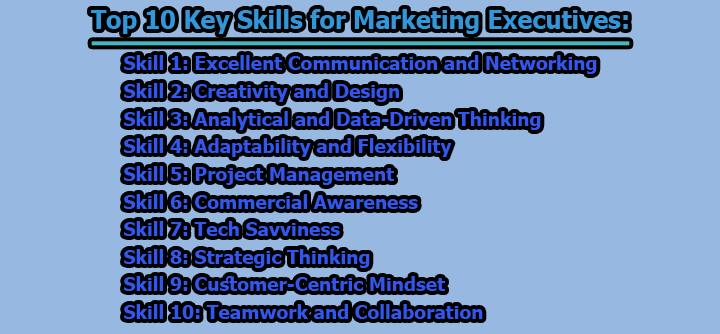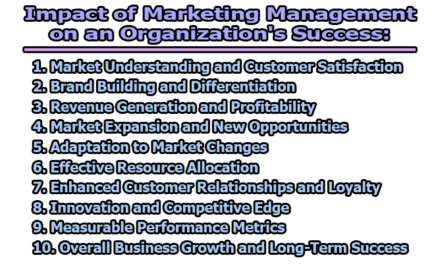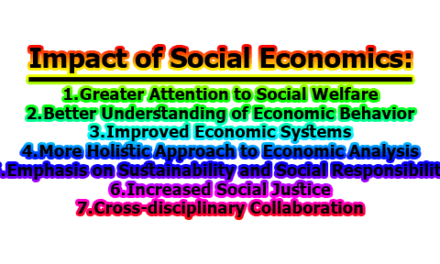Top 10 Key Skills for Marketing Executives:
In the fast-paced and competitive world of marketing, success relies on the skills and abilities of marketing executives who craft and execute innovative strategies. As technology continues to transform the marketing landscape, marketing executives must possess a diverse skill set to adapt and thrive. This article delves into the top 10 key skills for marketing executives to excel in their roles and drive business success. From communication and creativity to data analysis and adaptability, these skills are the pillars of a successful marketing career.
Skill 1: Excellent Communication and Networking:
At the core of every successful marketing executive lies excellent communication skills. The ability to articulate ideas clearly, both verbally and in writing, is crucial for conveying marketing messages effectively to target audiences. Marketing executives must be adept at crafting compelling and persuasive copy that resonates with customers and drives engagement.
Furthermore, networking plays a pivotal role in marketing. Building strong relationships with clients, colleagues, industry influencers, and media personnel can open doors to new opportunities and collaborations. Effective networking can also lead to valuable insights into market trends and customer preferences.
Skill 2: Creativity and Design:
In the ever-evolving world of marketing, creativity is the driving force behind successful campaigns. Marketing executives must possess the ability to think outside the box, develop innovative ideas, and create visually appealing content that captures the audience’s attention.
A keen eye for design is equally important, as marketing materials need to be aesthetically pleasing and aligned with the brand’s identity. Whether it’s designing eye-catching graphics, engaging social media posts, or attention-grabbing advertisements, creativity and design skills are vital for standing out in the crowded marketing landscape.
Skill 3: Analytical and Data-Driven Thinking:
In today’s data-driven marketing era, marketing executives must be proficient in analyzing data to gain valuable insights into consumer behavior and campaign performance. A strong understanding of analytics tools and techniques enables them to make data-driven decisions and optimize marketing strategies.
By interpreting metrics such as click-through rates, conversion rates, and customer engagement levels, marketing executives can identify trends, spot areas for improvement, and refine their campaigns to achieve better results. Analytical thinking empowers marketing executives to stay ahead of the competition and capitalize on emerging opportunities.
Skill 4: Adaptability and Flexibility:
The marketing landscape is continuously evolving, driven by technological advancements and changing consumer preferences. Marketing executives must possess a high degree of adaptability and flexibility to respond quickly to shifting market dynamics.
Being open to change allows marketing executives to embrace new strategies, experiment with emerging platforms, and leverage the latest marketing trends. Embracing adaptability ensures that marketing campaigns remain relevant and resonate with target audiences, regardless of how trends may fluctuate.
Skill 5: Project Management:
Marketing campaigns involve multiple moving parts and stakeholders. Effective project management skills are essential for marketing executives to ensure that campaigns are executed seamlessly and on schedule.
By setting clear objectives, establishing timelines, and coordinating team efforts, marketing executives can keep campaigns on track and achieve their intended outcomes. Strong project management skills also enable them to handle unexpected challenges and pivot when necessary.
Skill 6: Commercial Awareness:
Marketing executives must possess a keen sense of commercial awareness to understand market trends, customer preferences, and competitor activities. Being aware of the broader business landscape allows them to make strategic decisions that align with the organization’s goals and vision.
Through market research and competitive analysis, marketing executives can identify untapped opportunities, address customer pain points, and position their products or services advantageously. Commercial awareness ensures that marketing efforts are purposeful and contribute directly to the organization’s bottom line.
Skill 7: Tech Savviness:
As technology continues to drive marketing innovations, marketing executives must stay technologically savvy to leverage digital tools and platforms effectively. Proficiency in using social media platforms, content management systems, marketing automation software, and data analytics tools is crucial for executing successful digital marketing campaigns.
By keeping abreast of the latest technological developments, marketing executives can identify emerging trends and capitalize on new avenues for reaching target audiences.
Skill 8: Strategic Thinking:
Marketing executives play a vital role in shaping the overall marketing strategy of an organization. Strategic thinking allows them to align marketing initiatives with the company’s long-term goals and objectives.
By analyzing market trends, customer insights, and competitor activities, marketing executives can develop comprehensive marketing plans that drive sustained growth. Strategic thinking enables them to make informed decisions, allocate resources effectively, and optimize marketing efforts for maximum impact.
Skill 9: Customer-Centric Mindset:
Understanding the needs, preferences, and pain points of customers is paramount in successful marketing. A customer-centric mindset allows marketing executives to tailor campaigns that resonate with the target audience and create meaningful connections.
By conducting customer research, surveys, and focus groups, marketing executives can gain valuable insights into customer behavior and preferences. Utilizing this information, they can craft marketing messages and campaigns that address customer needs and foster brand loyalty.
Skill 10: Teamwork and Collaboration:
Marketing executives rarely work in isolation. Effective teamwork and collaboration are essential for seamlessly executing complex marketing campaigns that involve various departments and stakeholders.
Marketing executives must collaborate with creative teams, sales teams, product managers, and external agencies to ensure a cohesive approach to marketing initiatives. By fostering a collaborative work environment, marketing executives can leverage diverse expertise and perspectives to create truly impactful campaigns.
In conclusion, the role of marketing executives is evolving rapidly, driven by advancements in technology and changing consumer behavior. To succeed in this dynamic landscape, marketing executives must possess a diverse range of skills, from excellent communication and networking to data-driven thinking and adaptability. These skills enable them to craft innovative campaigns, analyze performance metrics, and stay ahead of the competition. By embracing creativity, honing their analytical acumen, and fostering a customer-centric mindset, marketing executives can drive success for their organizations and build lasting connections with target audiences. As the marketing landscape continues to evolve, the value of these key skills will remain constant, making them indispensable assets for aspiring marketing executives seeking to excel in their careers.
Frequently Asked Questions [FAQs]:
What is the role of a marketing executive?
A marketing executive is responsible for contributing to marketing campaigns that promote products and services. They play a crucial role in raising brand awareness, defining target audiences, coordinating promotional activities, managing multimedia content, and monitoring the performance of marketing campaigns.
How important is creativity in marketing executive roles?
Creativity is paramount in marketing executive roles. It allows marketing professionals to develop innovative ideas, create engaging content, and differentiate their campaigns from competitors. A creative approach helps capture the audience’s attention and build a strong brand identity.
Can marketing executives work remotely?
Yes, with the advancement of technology and digital marketing tools, many marketing executives can work remotely. However, the feasibility of remote work may vary based on the nature of the marketing role and the organization’s policies.
What industries typically employ marketing executives?
Marketing executives are in demand across various industries, including media and entertainment, professional services, consumer goods manufacturing, retail, energy supply, local authorities, charities, and education providers.
Are marketing degrees essential for becoming a marketing executive?
While a marketing degree can be beneficial, it is not always essential. Marketing opportunities are open to graduates from various disciplines, such as economics, business, statistics, or sociology. Practical experience in running social media accounts, creating multimedia assets, and effective communication skills are also crucial for marketing roles.
How can marketing executives stay updated with industry trends?
Marketing executives can stay updated with industry trends by regularly reading marketing publications, attending industry conferences and webinars, participating in professional development courses, and networking with other marketing professionals.
What is the typical career path for marketing executives?
The career path for marketing executives can vary based on individual preferences and opportunities. It often involves starting as a marketing assistant or coordinator, advancing to marketing executive roles, and eventually moving into management or specialized marketing positions.
How can marketing executives measure the success of their campaigns?
Marketing executives can measure the success of their campaigns through various metrics, including click-through rates, conversion rates, engagement levels, customer feedback, and return on investment (ROI). Data analytics tools play a crucial role in analyzing campaign performance.
How can aspiring marketing executives gain relevant experience?
Aspiring marketing executives can gain relevant experience through internships, volunteering with charities, working on university marketing projects, participating in marketing-related extracurricular activities, and seeking part-time jobs that provide marketing-relevant skills.

Library Lecturer at Nurul Amin Degree College










